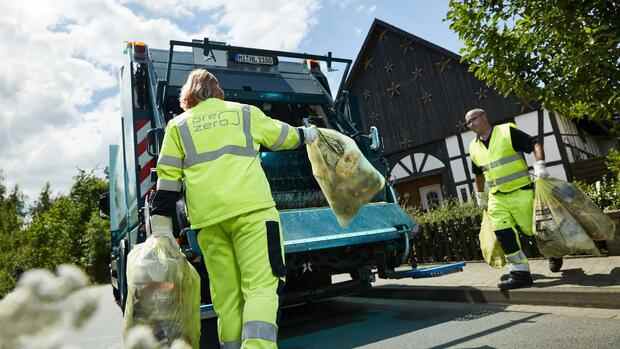The retail sector has recognized that plastic waste is a valuable secondary raw material.
(Photo: PreZero)
At first glance, you might think that a company is getting bogged down. The Schwarz Group, the parent company of Lidl and Kaufland, does not invest billions in the purchase of retail concepts, but in the takeover of waste companies. The Schwarz subsidiary Prezero will soon be one of the five largest waste disposal companies in Europe.
But this step is logical and necessary. And that’s exactly why Aldi is now following its arch-rival on this path. Because the recycling of packaging is increasingly becoming a strategic success factor in retail.
In view of ever stricter climate protection requirements, it would be negligent for large retailers to leave the recycling of their packaging to chance and changing partners. Aldi, Lidl and Co. can only make real progress in reducing CO2 with a holistic system that has everything in one hand, from packaging design to collection and reprocessing.
A few years ago, pioneers such as the cleaning agent manufacturer Frosch were still alone with their demand to create closed loops for packaging. It is now evident that there is no longer any alternative.
Top jobs of the day
Find the best jobs now and
be notified by email.
The drugstore chain dm is now also calling on customers to return empty shampoo bottles to the branches so that they can be converted back into new bottles in a more targeted manner than before. The circular economy is becoming a core competence. And such actions are also good for the image.
Plastic is becoming a valuable raw material
But it is much more than greenwashing, i.e. clever self-portrayal as a green company: while retailers recently viewed plastic waste as an annoying leftover from their own business, they have now recognized that packaging waste is a valuable secondary raw material.
If retailers want to meet the recycling quotas for the packaging that they have imposed on themselves, they must have secure access to the recyclates, the unmixed, reused plastics. And what better way to guarantee that than with direct control over your own sorting systems?
The entry of dealers into the waste management industry shows that environmental protection is no longer a fashion issue, it is about tough business. That’s good news. Because it is now clear to retailers: circular economy is part of the core business – and creates a competitive advantage.
More: Aldi attacks Lidl: Discounters are now also fighting for the garbage business
